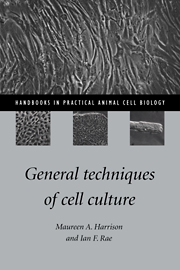9 - Specialized techniques
Published online by Cambridge University Press: 02 February 2010
Summary
The main purpose of this book is to provide basic information sufficient for anyone unfamiliar with, or with relatively little experience of, cell culture techniques, to get started and produce comparatively small amounts of cells successfully. In this chapter, an introduction is given to some of the more specialized techniques used in cell culture, including those designed primarily for maximizing the yield of cells or cell product and for immortalizing cells.
Scaling-up
Some techniques are specific to adherent (anchorage–dependent) cells, some to suspension cells, and some can be used for either type.
Specifically for adherent cells
There are various methods available to increase the yield of cells beyond that obtained from the basic culture flask. The main method designed specifically for adherent cells is the use of microcarriers.
Microcarrlers
Microcarriers are minute beads made from various materials available from several suppliers in various sizes and specific gravities (see Table 9.1).
Some microcarriers are solid beads allowing cells to grow only on the outer surface and some are ‘macroporous’ constructed like a sponge where the cells grow not only on the outer surface but within the microcarrier itself greatly increasing the yield (20– to 50–fold). The use of microcarriers enables adherent cells, once attached to the microcarriers, to be grown in a spinner vessel or fermenter as a stirred culture allowing comparatively large numbers of cells to be grown in a relatively small volume of medium. It is possible to recover the cells from the microcarriers by the use of a proteolytic enzyme such as trypsin but not all the cells will be recovered if the macroporous type are used.
- Type
- Chapter
- Information
- General Techniques of Cell Culture , pp. 122 - 138Publisher: Cambridge University PressPrint publication year: 1997

